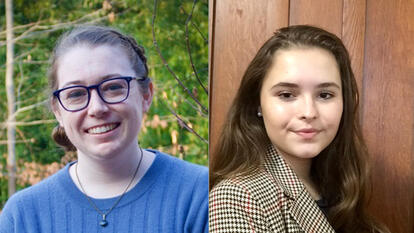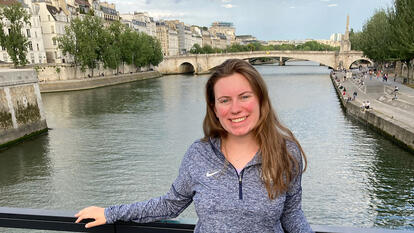Amal Cheema ’17 Receives Prestigious Watson Fellowship

Amal Cheema ’17 has been awarded a 2017 Thomas J. Watson Fellowship. The one-year grant supports travel in pursuit of a dream project for approximately 40 graduating college students nationwide. Cheema’s fellowship will enable her to study how cultural and religious beliefs impact people’s opinions and choices regarding organ donation.
“The Watson Fellowship offers a remarkable opportunity for each recipient to travel around the world exploring a topic that has deep personal resonance. Such a journey—alone, unstructured, and unfamiliar —is both deeply challenging and personally transformational,” said Elizabeth Mandeville, director of Exploration and Experiential Learning and campus liaison for the Watson Fellowship. “Amal is perfectly poised to take on this profound and complex subject. She has a wealth of humanity, humility, curiosity, and intrepidness that will serve her well as she embarks on this year of exploration and growth. We are so proud of her.”
Cheema, who hopes to become a physician, said the idea for the project came from the fact that most nations desperately need organ donations, yet ethical questions can be barriers to donor registration for certain groups. For example, would a Hindu accept an organ from a Christian who eats beef? How does receiving an organ influence one’s beliefs, family, or community? Do different rates of organ donation alleviate or exacerbate tensions among communities?
To answer those questions, Cheema, an Albright Fellow and a double major in biochemistry and political science, will travel to several countries to research how people reconcile organ donation—a relatively new medical advance—with religion at a time of increased globalization and radicalization. Her itinerary may include Malaysia, Singapore, India, Germany, France, and the United Kingdom, all of which are religiously diverse and are seeing political tensions among faith-inspired communities.
In each locale, Cheema plans to attend various religious observances, volunteer at health facilities and organ donation centers, and speak with patients waiting for organs and those who have received them. She will also research the effectiveness of government donation programs and the donation rates among minority and immigrant populations.
Cheema, who grew up Muslim in Sharon, Mass., a town with numerous synagogues and churches, does not intend to change anyone’s beliefs about theology, donor registration, or science during her year abroad. Instead, she hopes to develop an understanding of how faith can affect a person’s health practices, even among atheists and nonspiritual scientists.
“As a doctor and researcher, I will face ethical questions about a variety of issues: prescriptions, trial enrollment, and organ donation,” she said. “I hope to protect human dignity during a patient’s most vulnerable time. Perhaps, the first step is to understand a person’s values, because illness is not [just] a physical symptom, but a life experience that challenges identity.”
Cheema said that many of her interactions at Wellesley helped prepare her for the challenges she will face as a Watson fellow. “My professors and peers taught me that wherever you look, there is a question that needs to be explored and that can speak to your meaning in life,” she said. “When you find one, you must believe you can answer it and realize that you may be surprised by what you discover.”
She continued, “I hope that the Watson fellowship enables me to do something good for my neighbors, near or far. I have lived a privileged life largely because of the zip code in which I was born. I hope that whatever work I do in the future allows me to ensure the opportunities I have received are possible and plausible for others.”



